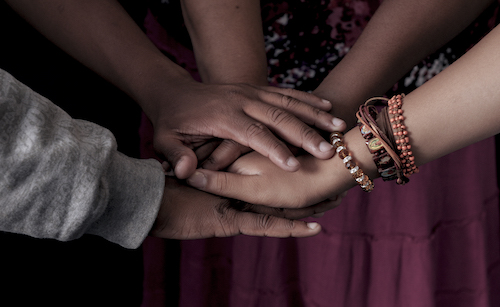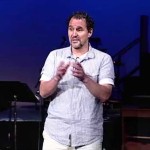We run our website the way we wished the whole internet worked: we provide high quality original content with no ads. We are funded solely by your direct support. Please consider supporting this project.

The Purpose of the Church
Unlike most social groups, the relationships forged in the body of Christ are not ends in and of themselves. Rather, Christ calls us to unite with other believers for a unique purpose: to grow in, express and advance the kingdom revolution. We can gain clearer understanding of what the church is to be about by discussing three closely related aspects of its purpose, as spelled out in the New Testament.
Serving God. First, in response to God’s unfathomable love to us expressed in Jesus Christ, the church is called to love and serve God. As people who are submitted to the reign of God, we are called and empowered to live in a way that declares God’s worth, that is, that worships God. Our lives, individually and collectively, are to be living sacrifices, pleasing to God because they reflect the sacrifice of Jesus Christ (Rom. 12:1-2; Eph. 5:2).
Members of the body of Christ are called not only to worship God with our lives, however. Individually and collectively, we need times devoted to ascribing worth to God through song, art, dance and other creative means. Following the pattern of Scripture, these special times of worship may include enthusiastic celebratory declarations of who God is and what he has done, as well as quiet reflective expression of love offered directly to God. Both are necessary to the spiritual health and vibrancy of the church.
Serving Each Other. A second focus of the church’s purpose is for kingdom people to love and serve one another. One primary way disciples do this is by taking care of the needs within their body. Having relinquished all our possessions and rights, in obedience to Jesus, we are to be ready to share with any who are in need (Rom 12:13).
Similarly, disciples are called to serve one another by allowing God to use their gifts to help others. The Holy Spirit distributes gifts throughout the body for the good of the whole (1 Cor 12). Some have a gift for pastoring, teaching or evangelism. Others have a gift of hospitality, administration or compassion. Still others are given supernatural gifts such as words of knowledge, the ability to speak in tongues and/or to interpret tongues or the ability to heal people. In appropriate contexts, all are called to offer their gifts in service to the kingdom community as a whole.
Finally, disciples within a particular church body are called to orientate their life around the community to such a degree that bonds of trust form. Only to the extent that this happens can we help one another become the bride Christ wants to return for. Only to the extent that this happens can we speak the truth to one another in love and experience Christ being formed in each one of us accordingly (Eph 4:15). Only to the extent that this happens can all the “one another’s” of the New Testament be implemented (See post on “one another’s”) in our kingdom communities in healthy, non-judgmental, godly ways.
Whatever form it takes, the way disciples love and serve each other in community is to reflect the love of the triune God and give reason for non-believers to acknowledge that the Father sent Jesus (Jn. 17).
Serving the World. The third focus of the church’s purpose is the world. Every individual disciple, and every local kingdom community, is called and empowered to love and serve people the way Christ has loved and serves us. The primary way we serve the world is simply by bearing witness to the Lordship of Christ and the reality of the kingdom he has brought into the world. By God’s own design, people are to witness the love and power of the triune God in his bride (Acts 1:8). They are to be demonstrations of the beauty of God’s goal for humanity and creation in their lives as his “first fruits” (Jam 1:18).
In bearing witness to the reality of the kingdom by how we live, we are offering hungry people an alternative way of doing life. Those who have grown sufficiently weary and sick of chasing after idols and have discovered the emptiness of life lived according to the pattern of this world are attracted to this alternative life. This is how the mustard seed revolution grows.
Along the same lines, the church’s ministry to the world includes reflecting God’s love and care by taking responsibility for the ills of society as God leads us. It’s not the job of the church to fight over and try to enforce what we think government should do about society’s problems—as though Christians were any wiser than anyone else about such matters. Rather, following the example of Jesus, our job is to simply live in a self-sacrificial way that reflects God’s love and concern for the victims of social ills and thereby revolt against the principalities and powers (Eph 6:12) behind all such ills.
Photo credit: Freely Photos
Category: General
Tags: Church, Kingdom Living
Topics: The Church
Related Reading

Sermon Clip: Love: It’s All About the Cross
In this sermon clip, Greg Boyd talks about how Colossians 3:14 and the definition of love. God designed creation so that we would live in community with God and express God’s love towards each other and creation. However, sin disconnected us from God. In this sermon, Greg shows how we were created in the image…

The Case for Women in Ministry
Kathy’s Struggle with Temptation Kathy was one of the brightest students I ever had when I taught Theology at Bethel University. She asked insightful questions and often contributed to lively class discussions. The time and energy she put into her theology classes was motivated by more than just a desire to get a good grade.…

What is the Kingdom of God (Part 1)
We all know what the Kingdom of God is, right? But this is precisely the problem. Since we are all to a large extent products of our culture, what seems obviously true and right to us will be at least influenced, if not determined, by what seems obviously true and right to our culture. This,…

Cheap Grace and Consumer Christianity
The “cheap grace” Gospel sells well in America. We live in a culture of consumerism that conditions us to habitually look for “the best deal.” We’re more or less trained from birth to live in the question; “How can we get the most for the least?” We think this way about our houses, cars, clothes,…

Podcast: What if I Don’t Like Church?
Greg and Dan talk about what to do when we do not like church. http://traffic.libsyn.com/askgregboyd/Episode_0450b.mp3

Remembering that We are Finite
Here’s a little reminder from Joshua Becker that we live with limited resources in the areas of “Money. Time. Energy. Attention. Physical Space. Relationships. Mental Capacity. Body. Talents. Natural Resources.” Let’s spend these things with wisdom and love. From the blog: This reality of our finiteness is an incredibly important truth. It is one we should intentionally choose to focus on…
